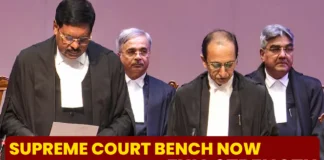
Petition argues that the existing 5-year LL.B structure contradicts NEP 2020 and imposes financial stress on students.
News Desk, New Delhi, 09-May:In a recent development, the Supreme Court considers on Friday and took note of a Public Interest Litigation (PIL) seeking the replacement of the current 5-year integrated law degree course with a 4-year LL.B programme, in line with the National Education Policy (NEP) 2020, which advocates four-year undergraduate degrees for professional disciplines.
A division bench comprising Justice Vikram Nath and Justice Sandeep Mehta heard the plea filed by Advocate Ashwini Kumar Upadhyay, but chose not to issue a formal notice. Instead, the Court tagged the matter with an existing case involving the validity of the one-year LL.M course, which is currently pending before Justice Surya Kant’s bench.
The petitioner alleged that the 5-year B.A. LL.B and B.B.A. LL.B programmes have been designed more as a revenue-generating tool than an educational necessity, calling it a “dirty trick in the name of education.” He urged the Court to direct the Union Government to establish a Legal Education Commission or Expert Committee comprising jurists, professors, retired judges, and senior advocates to comprehensively review the syllabus, curriculum, and duration of both LL.B and LL.M courses.
“Five-year duration is disproportionate to the actual course content. It delays financial independence for students and adds unnecessary burden on middle and lower-class families,” the petition stated.
The petitioner highlighted that NEP 2020 promotes four-year professional degrees, yet the Bar Council of India (BCI) has allegedly taken no steps to align legal education with this framework.
When Senior Advocate Vikas Singh appeared for the petitioner, Justice Nath remarked, “You think something important is raised in this PIL?” Singh explained that financial constraints faced by ordinary families — citing the case of a yoga instructor struggling to pay his daughter’s five-year law school fees — motivated him to support the cause.
Singh added, “The education policy itself allows four-year professional courses. So why not law?”
While the bench suggested that the matter may be better addressed by the Bar Council of India, it agreed to tag this plea with the pending case concerning the one-year LL.M, which has raised similar concerns about course duration in professional legal education.
This is not the first time Advocate Upadhyay has moved the top court over this issue. In April 2024, he filed a plea seeking a 3-year LL.B course post-Class 12, which was dismissed. At the time, then CJI DY Chandrachud remarked that “we need mature people coming into the profession,” praising the 5-year integrated programme as a beneficial reform.
🧑⚖️ For more legal developments and education reforms, browse our Legal Views section or catch expert panel discussions on our YouTube channel.




